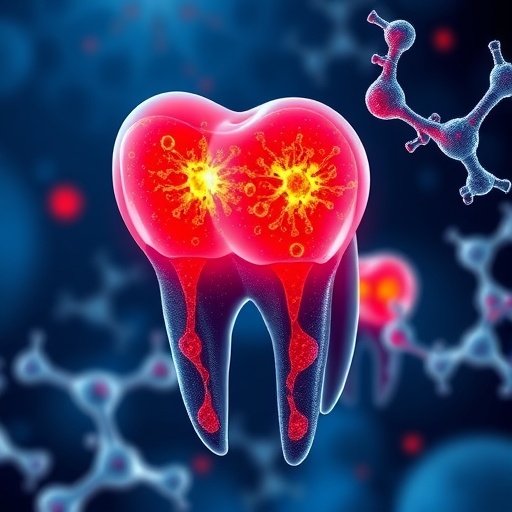A groundbreaking study emerging from the University of North Carolina at Chapel Hill has unveiled pivotal insights into the biological underpinnings of periodontitis, a pervasive and destructive inflammatory gum disease. This research, conducted collaboratively by experts at the UNC Adams School of Dentistry and the UNC School of Medicine, precisely delineates the role of the inflammasome—an integral component of the innate immune response—in driving disease progression, notably with a striking sex-specific dimension. The study’s findings open new avenues for precision medicine by demonstrating that inflammasome inhibition effectively prevents bone resorption predominantly in males, thereby challenging existing paradigms and underscoring the necessity for sex-tailored therapeutic strategies.
Periodontitis is characterized by inflammation-induced degradation of the alveolar bone surrounding teeth, leading to tooth instability and potential loss. This condition affects millions globally, and intriguingly, epidemiological data have consistently shown a higher prevalence and severity in male patients. The UNC-led research sought to unravel the molecular and cellular mechanisms behind this sex disparity, focusing on the inflammasome’s contributions to the pathological inflammatory cascade. Prior assumptions suggested a uniform role of inflammasome activation across sexes in inflammatory diseases, but this comprehensive investigation reveals a far more nuanced picture, illuminating critical biological distinctions.
The inflammasome is a cytosolic multiprotein complex responsible for sensing pathogenic microorganisms and cellular stress signals, subsequently initiating the cleavage and activation of pro-inflammatory cytokines such as interleukin-1 beta (IL-1β). IL-1β is a potent mediator of inflammation and bone resorption, implicating it as a key driver in periodontitis pathology. To substantiate the inflammasome’s involvement, researchers meticulously analyzed gingival crevicular fluid samples from over 6,200 human participants across multiple independent cohorts. The analyses revealed a robust sex bias in IL-1β expression; male subjects consistently exhibited elevated IL-1β levels even in healthy states, with a marked amplification during periodontitis progression. This disparity highlights a potential intrinsic susceptibility to inflammasome-mediated inflammatory amplification in males.
To delve deeper mechanistically, the scientists utilized genetically engineered murine models to interrogate inflammasome functionality in vivo. Male mice demonstrated augmented secretion of IL-1β relative to females, corroborating human clinical observations. Furthermore, male mice harboring deletions in key inflammasome genes displayed significantly attenuated alveolar bone loss, concretely establishing a causal link between inflammasome activity and bone resorption in male periodontitis. Pharmacological intervention using caspase-1/4 inhibitors—agents impeding inflammasome-mediated cytokine maturation—yielded dramatic reductions in inflammatory cell infiltration and osteoclastogenesis signaling pathways in males, effectively safeguarding against tissue destruction.
Remarkably, the same inflammasome blockade produced negligible effects in female mice, illuminating a sex-specific mechanism in the inflammatory circuitry leading to periodontal bone loss. Even when gonadectomy procedures were performed—removing testes from males and ovaries from females—the response pattern persisted. Male mice that underwent orchiectomy lost sensitivity to inflammasome inhibition, underscoring the pivotal role of testicular hormones or factors emanating from the male reproductive system in modulating inflammasome-driven inflammation. In contrast, ovariectomized females remained unresponsive to inflammasome targeting, suggesting alternative, sex-specific pathways mediate bone loss within female hosts.
These findings resonate deeply within the broader context of sex differences in incidence, severity, and treatment responsiveness of inflammatory diseases. The revelation that inflammasome activation disproportionately drives male periodontitis not only challenges the one-size-fits-all therapeutic paradigm but also stresses the critical imperative to incorporate sex as a biological variable in designing and testing new interventions. Such sex-stratified approaches promise enhanced efficacy and precision, particularly by tailoring treatments targeting molecular processes like the inflammasome that exhibit sex-dependent activity patterns.
Beyond the immediate clinical implications, the study prompts a paradigm shift in our understanding of immunopathology. It compels researchers to reassess the molecular drivers of inflammation with a fine-grained eye toward sex hormones, genetic expression differences, and immune signaling pathway dynamics. Additionally, it alerts clinicians to the potential limitations of inflammasome-targeted treatments in female patients, highlighting an urgent need to identify alternative molecular targets responsible for periodontitis progression in women. The pursuit of such targets holds promise for expanding effective therapeutic options across genders.
This research exemplifies the power of integrative, interdisciplinary approaches bridging human clinical data with robust animal model experimentation. It leverages high-throughput analyses of human biomarker profiles, state-of-the-art genetic manipulation in mice, and advanced pharmacologic intervention techniques to paint a comprehensive, mechanistic picture of disease pathogenesis. The methodological rigor and multifaceted design underscore the study’s robustness and its potential to serve as a blueprint for investigating other inflammatory and autoimmune conditions exhibiting sex biases.
In conclusion, the UNC Chapel Hill study stands as a landmark contribution to oral immunology and precision dentistry, fortifying the concept that sex-specific biological mechanisms critically shape disease outcomes and therapeutic responses. The delineation of inflammasome-driven, male-biased periodontitis offers a tangible target for clinical intervention, heralding a new era of personalized oral healthcare. As research continues to unravel the complexities governing female periodontitis pathogenesis, emerging therapies can be anticipated to address this unmet clinical need with equal precision and efficacy.
Through its innovative focus on sex-differentiated inflammation and bone biology, this work not only advances scientific knowledge but also carries profound implications for public health. Considering the vast global burden of periodontitis and its sequelae—including systemic impacts such as cardiovascular disease and diabetes—the development of inflammasome-targeted, sex-specific therapeutics promises to improve quality of life for millions worldwide. This study paves the way for future investigations aimed at optimizing treatment efficacy through tailored molecular interventions aligned with patient sex, thus embodying the forefront of personalized medicine in dentistry and beyond.
Subject of Research: Sex-specific mechanisms in periodontitis pathogenesis
Article Title: Inflammasome targeting for periodontitis prevention is sex dependent
News Publication Date: 27-Oct-2025
Web References:
Proceedings of the National Academy of Sciences journal: https://www.pnas.org/doi/10.1073/pnas.2507092122
DOI link: http://dx.doi.org/10.1073/pnas.250709212
Tags: bone resorption prevention in malesinflammasome role in periodontitisinflammatory diseases and sex disparitiesinflammatory responses in oral healthinnate immune response and periodontitismale-dominant periodontitis prevalencemolecular mechanisms of periodontitisprecision medicine in dentistrysex differences in gum diseasesex-specific treatment approachestherapeutic strategies for gum diseaseUNC research on periodontitis





